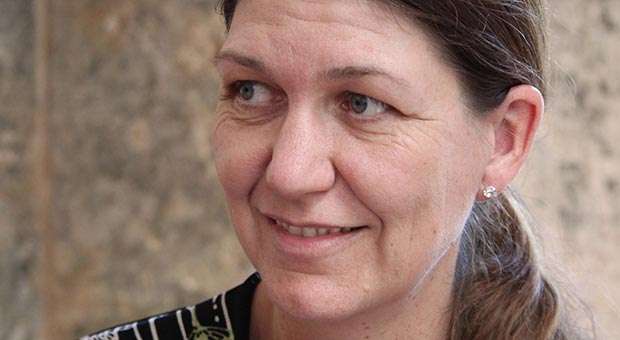Sonia Jacobsen described herself with long hair tied in a ponytail so that we can recognize her in the courtyard of Cuba ’s Nacional Hotel. H er third stay here was motivated to collaborate, in her role as a composer, in the concert ¨ Entre electroacústica y acústica¨, held on Sunday afternoon at Ignacio Cervantes Hall .
Through salsa, it all started th rough salsa, the interest in Cuban music, sounds and elements that form it , its origins, with that mixture of African and European that I found essential to the history of Latin music, and music in general. So I took Cuba as a starting point, and I came here with the intention of exploring Cuban music, to analyze its components, and see which of them can be traced to reach its roots.
On that first trip I met by chance Marita Rodriguez, professor at the Higher Institute of Art (ISA by its Spanish acronym). She was interested in a new music, something that sounded different, so I told her ok; I’ll send you my music. I sent it and indeed she liked it. That’s when I set out to make something, a concert or a recording, perhaps. And with that intention I came back last year with a friend from Switzerland , Michele Rusconi, also a composer, to see how we could do it, until finally this event was organized in conjunction with the National Laboratory of Electroacoustic Music, with a very interesting program that combines pieces of acoustic and electroacoustic music.
Working with Cuban musicians gave me the opportunity to notice certain differences with New York musicians, whom I’m more accustomed. Those from here are more of playing from within, passionately. And the musical culture they have, of very strong rhythms, allows them to better understand my music, which has some influence from Eastern Europe, like many Cuban musicians who studied abroad.
Since being here I’ve been able to keep more in touch with Cuban sounds, timba, rumba, d anzon and son, which can be listened to everywhere, jazz … Cuban jazz players sound just like the best jazz musicians in New York because they have an exchange from the outside that allows them to b e aware of what is done today in the world. However, that does not happen with classical music. They are still exposed to traditional teaching- especially the Russian school-which is great, but it is not from the last fifty years.
As for the timba I had an interesting experience. Before knowing Cuba, I could not understand it very well, I could not appreciate it. I was more interested in salsa. And that also happens to many salsa dancers and fans, who can not get to like the timba. I think the reason for this is that, at first instance, timba has a darker rhythm, harder to listen to and dance it, when compared with traditional salsa from Colombia, Puerto Rico, etc… Also, in the beginning the timba had some resemblance to the electronic salsa; it used synthesized sounds and electric guitar. It was not like traditional salsa made by Cubans in New York, trying to be more authentic. Cuban t imba is in part opposite t o that tradition. Then when I got here, I had a turning moment when hearing Cuban musicians playing it live: ah, that’s what timba is about!
Regarding the electroacoustic music … I am now at an exploratory stage, including Juan Blanco’s work, because that’s not really my area. My music is a kind of mixture between jazz, classical music and world music, because now multiple elements can be combined and lead music to where you, the creator, want, without compromising the product or art.
Y oung Cuban musicians really liked my work. They somehow feel very identified with my music, which without being too much avant-garde, it does incorporate rhythm and power: a kind of serious music for young people. They asked me if I could return to work with them, so I’m writing a specific piece for them, for another concert in conjunction with the aforementioned entity, to be held in December, maybe.
Currently I combine the exercise of songwriter with that of Latin music professor at the University of South Carolina. C omposition has its ups and downs. So I also perform as director , though I not consider m yself as such. I used to play the saxophone, but not anymore.
– And don’t you miss the interpretation?
Not exactly. J azz musician life is sometimes too hard.
Written by: Cynthia de la Cantera Toranzo
Photo: Alba Leon










